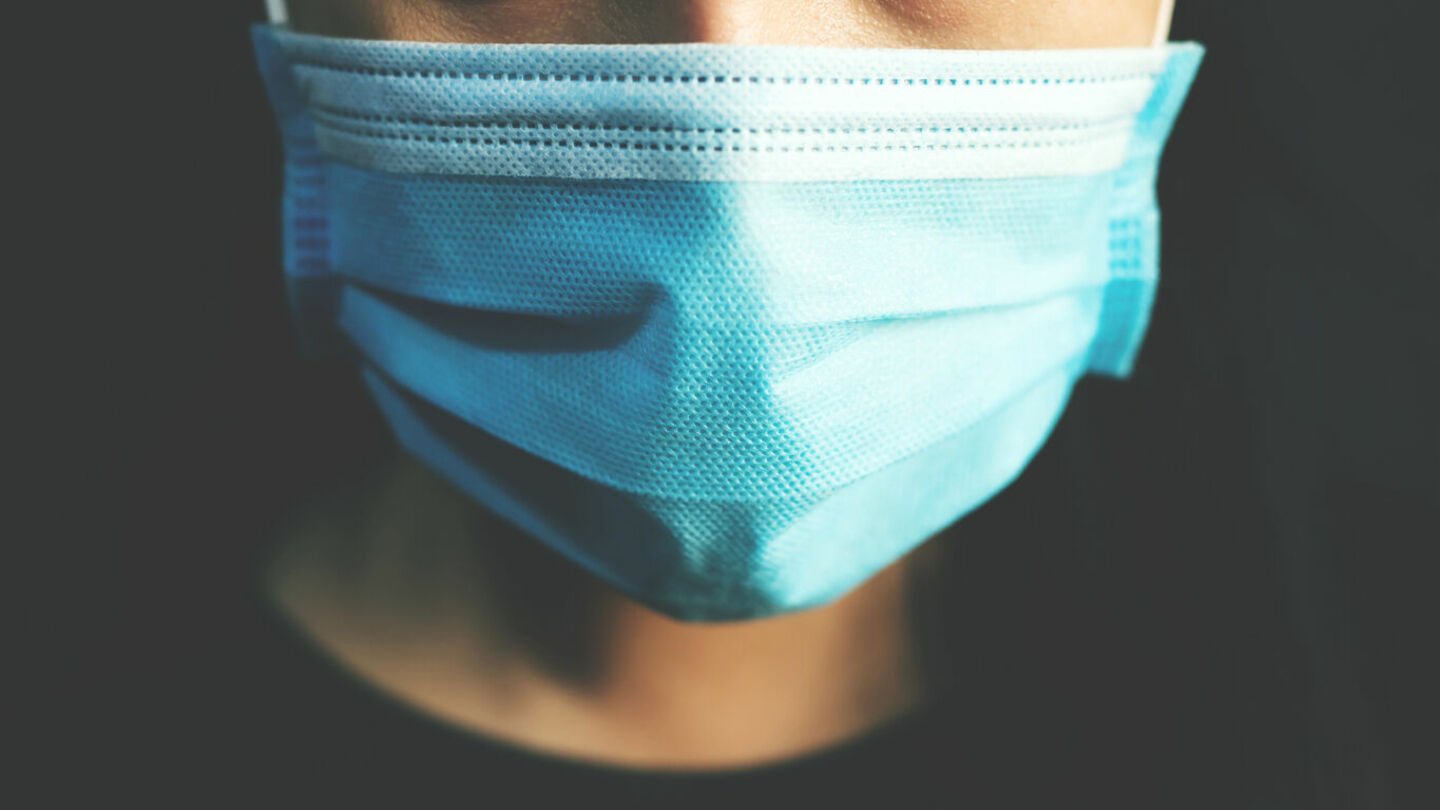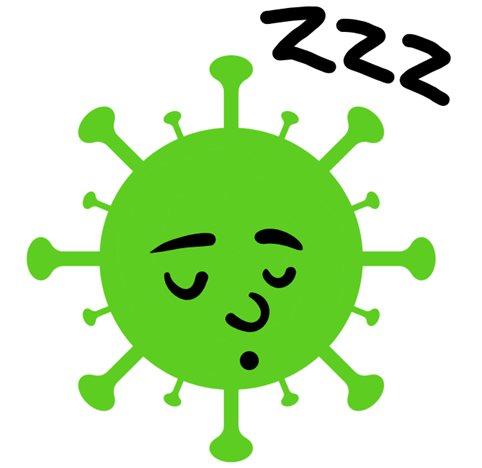
“A major outbreak is far from realistic at this point”
Looking back on the COVID-19 crisis in higher education
Universities and universities of applied sciences had little or no concern about that strange coronavirus in China – until they suddenly had to close their doors, even before the “intelligent lockdown”. Here, we present a retrospective on the COVID-19 crisis, with the knowledge of today.
Five years ago, COVID-19 reached the Netherlands. Lockdowns, online exams, student protests, 500 million euros wasted on self-tests... How did higher education navigate the COVID-19 crisis?
We will explore five key themes: the lead-up to the crisis, the protests against online proctoring of exams, the introduction of free self-tests, student well-being and the tug-of-war over binding recommendations (BSA). Finally, we will take a look into the crystal ball: how will the next pandemic play out?
The lead-up: sleepwalking into the pandemic
It is easy to say with hindsight, but higher education did not respond quickly to the arrival of the coronavirus. It appeared, at times, as if institutions preferred not to be well-prepared.
January 2020
A strange virus has emerged in the Chinese metropolis of Wuhan. It’s spreading rapidly and is quite dangerous. China extends vacations and closes its universities. The news spreads around the world.
January 29, 2020
It is possible, of course, for the virus to make its way here, for example through exchange students. The Higher Education Press Bureau (HOP) wonders: should Dutch higher education start preparing for the arrival of COVID-19? But universities and universities of applied sciences see things differently and are keeping a cool head.
“Obviously, the effects of this virus are terrible,” says someone from Wageningen University, “but we need to realize just how large a country China is, and how large its population is. We keep track of the reports from the Ministry of Foreign Affairs and the National Institute for Public Health and the Environment (RIVM), but we don’t believe there’s any cause for extra concern at this moment.” The reaction in Groningen is just as calm. “Our exchange students in China do not reside in the risk areas,” says a spokesperson, “so we don’t take any further measures at this point.”
The response is the same everywhere. Universities and universities of applied sciences keep in touch with their students in China, but none of them sound alarmed. They’re waiting to see what will happen – if anything will happen at all.
January 31, 2020
A few days later, the Ministry of Foreign Affairs changes its travel advisory: code red for Wuhan and the surrounding province, orange for the rest of the country. Most institutions follow this advice. The new guideline is: only go to China if absolutely necessary. And avoid Wuhan.
At some universities of applied sciences, the severity of the situation starts to become more apparent. Three major higher vocational education (HBO) institutions ban travel to China. “We do not consider it responsible for students or employees to travel to China,” says Rotterdam University of Applied Sciences. The main concern is the safety of students and staff. What if they are suddenly stuck there and cannot return home? Avans and Arnhem Nijmegen University of Applied Sciences opt for the same approach.
February 25, 2020
There is a severe outbreak in Northern Italy. Educational institutions are closing their doors, just like they did in China. About four thousand Italians are studying in the Netherlands, and two hundred students go on exchange to Italy every year. And that’s not even counting the people who go on vacation there. It’s only a matter of time before the virus strikes here.
The HOP calls the RIVM. In the event of a major outbreak (“That is far from realistic at this point”), the government could also close educational institutions in the Netherlands, a spokesperson confirms. But this will depend on the situation. “What’s the epicenter of the outbreak, and how many people are infected?”
“Lecturers and students should check in advance if working from home could be an option, should the situation require it,” the HOP writes on its own authority. “Do they have access to all of their files? Is there a book they might need to take home?” We have to write it ourselves, though, because the ministry doesn’t want to get ahead of things and the umbrella organizations of universities and universities of applied sciences are hardly willing to say anything other than that they are following the government’s advice.
Universities of applied sciences do have crisis plans in place, a spokesperson for the Netherlands Association of Universities of Applied Sciences acknowledges. “Thankfully, so far, we have had no need for them.” Somewhat relieved, we include this in our article.
A short while later, we get a phone call. Could we please add a single word to the piece? The association has been getting questions about whether those crisis plans are specifically for an outbreak of the coronavirus, and that’s not the case. They are general crisis plans, for all kinds of emergencies. The universities of applied sciences do not want to give the impression that they are preparing for the arrival of COVID-19.
February 27, 2020
The first COVID-19 infection is confirmed in the Netherlands. The news breaks on the last day of Carnival.
March 3, 2020
Stay home if you’re coughing, TU Delft advises. The university goes a step further than the RIVM, which is controversial. Tilburg University, for example, does not follow suit, despite infections in the city. There are now thirteen confirmed cases of COVID-19 in the Netherlands.
March 12, 2020
The virus is circulating. In various cities, students launch petitions demanding that their university or university of applied sciences close its doors. Healthy young students may not be at great risk, but “think of the professor giving your lectures: he’s no longer twenty,” warns an Amsterdam student. Three Italians studying in Maastricht criticize the Netherlands for its lack of awareness.
Still March 12
The cabinet is starting to feel uneasy, too. It asks institutions to offer major lectures online. In Austria and Denmark, institutions are shutting down completely, but Prime Minister Rutte has not yet reached that point: “Each country chooses its own measures.” However, shortly thereafter, the cabinet asks universities and universities of applied sciences to close their campuses until April 1 and stop all in-person education.
The institutions comply, but do not want to overreact. Universities only cancel events with more than 100 attendees, such as receptions and conferences. Universities of applied sciences cancel classes, but: “The buildings will remain open for other activities as much as possible.”
March 13, 2020
Amsterdam University of Applied Sciences (HvA) even keeps its doors open a day longer: not for large lectures, but for other classes. The ministry’s request came as a surprise, the educational institution tweets. “HvA wants to properly prepare for that. That is why we will use tomorrow to arrange the transition.”
March 15, 2020
It is decided that institutions will remain closed a week longer, until April 6. Cafés and sports clubs must also close, including student associations.
March 16, 2020
Prime Minister Rutte addresses the country from the Torentje. He talks about building up herd immunity. Locking the country down? That would be too extreme. A week later, he speaks of an “intelligent lockdown”.
Exams: can we look over your shoulder?
Everything has to be moved online, but what about exams? Can those be made online too? Of course they can, say the creators of surveillance software. Judges and politicians brush aside students’ principled objections, because necessity knows no law.
March 19, 2020
People start thinking about online exams early on in the COVID-19 crisis. Some tests can be taken at home without risk of cheating. After all, you write your thesis at home too. But there are also exams where cheating is easy if you have your textbook next to you and you can simply Google the answers. The solution? Proctoring: monitoring students online while they take their exams. The problem is that it’s a little expensive and may not be stable enough for large groups, it is estimated.
April 28, 2020
But there are principled objections as well. Turning on your webcam while taking an exam? Younger politicians (from VVD to SP) and political student organizations (ISO, LSVb and JOB’s senior secondary vocational education students) have serious issues with that. They protest against the use of such surveillance software.
But they are in a difficult position. Everyone is so happy that the programs were able to move education online in such an incredibly short period of time. Almost everything can go ahead – it’s a miracle. So why do students have to ruin the party with their principles?
You can’t force students into the dilemma of privacy violation or study delay, the youth objects. They do have a point: even ICT foundation SURF calls the privacy impact “very large.” But most institutions pay little mind, and even D66 minister Ingrid van Engelshoven thinks students shouldn’t make a fuss about it. That latter remark stirs up a lot of controversy. Presenter and activist Tim Hofman tweets that students definitely should make a fuss.
May 1, 2020
Some institutions do listen to the objections. Avans and University of Applied Sciences Leiden, for example. They announce that they will stop online proctoring. They trust their students not to cheat or find alternative ways to administer tests.
June 2, 2020
UvA’s central student council goes to court and demands that the University of Amsterdam stop proctoring. They lose their case but appeal the decision.
Almost a year later: April 2021
According to the minister, the participation body has no say in the use of proctoring. Students continue to protest, arguing that they have issues with it.
Exactly a year later: June 2, 2021
Even in the appeals court, the students are unsuccessful. These are rough times, reasons the Amsterdam Court of Appeal. And so, the University of Amsterdam is allowed to continue using the surveillance software – at least, as long as the COVID-19 measures apply.
December 15, 2021
The surveillance software has access to the cameras of laptops and phones as well as the Internet browser. Unfortunately, Proctorio, one of the most widely used programs turns out to be easy to crack. But that is no reason for The Hague to ban such software.
February 7, 2022
The Rutte-IV cabinet takes office. Will it steer a different course? No, Minister Robbert Dijkgraaf follows the path of his predecessor (and fellow party member). He has no intention of interfering with anti-cheating software. Institutions must weigh considerations themselves, he believes.
Self-tests: please stick this cotton swab up your nose
Providing all students and staff with free self-tests costs hundreds of millions of euros. The initial trials showed that this would be of little or no help in controlling the coronavirus, but no one wanted to hear that anymore.
February 2021
What a year we’ve had. Those lockdowns are awful. The question is: how do we keep society open, or at least education? One of the ideas is that maybe self-testing can help. If students find out that they have COVID themselves, they can stay at home, which will prevent major outbreaks. More than a year after the first outbreak, self-tests are being rolled out. The first vaccinations have already taken place at this point.
April 1, 2021
It’s not cheap. The cabinet allocates half a billion euros for free self-tests in higher education. This should allow students and staff to test themselves twice a week. The goal is to go back to one day of on-campus classes per week, even if there are not enough self-tests available yet.
April 8, 2021
But will it help? Students feel fairly invulnerable and are not very keen on using self-tests against the coronavirus, shows a pilot at Avans University of Applied Sciences. In the end, only 30 percent of the approached students ended up participating.
This is not the way to keep the virus out. The self-tests are not mandatory; you can simply attend classes without sticking a swab up your nose. It seems like half a billion euros might be wasted.
April 16, 2021
Then again, billions of euros in support measures are being handed out left and right. For example, the education sector has received 8.5 billion euros. Nobody seems to care about the waste of half a billion euros on self-tests. Universities, universities of applied sciences and student organizations want to go back to on-campus education as soon as possible, and the government is demanding free self-tests. Higher education is not going to object to this.
“In normal times, I would be furious about this,” says Dahran Çoban of the Dutch National Students Association (ISO). SP is the only political party that has reservations, but ultimately, the importance of education wins out.
April 19, 2021
We’ve been in the third wave for a while. The cabinet wants to give itself the option of making access tests mandatory in higher education, if absolutely necessary. But it won’t come to that.
July 5, 2021
Eventually, even Minister Van Engelshoven acknowledges that self-tests do not lead to more in-person teaching. Because despite the self-tests, higher education still has to comply with the social distancing rule, which means we can’t do much.
November 9, 2021
The news many people saw coming: not all students are ordering those free self-tests. In fact, only 30 percent are doing so. The uptake among staff is also disappointing: 61 percent. The minister says there are many orders, but “we initially expected more.” Still, people continue to use the self-tests.
March 16, 2022
Self-tests are no longer as important. The Omicron variant of the virus appears to be somewhat milder, perhaps thanks in part to the vaccinations. Students are no longer required to take preventive self-tests, the cabinet has decided. Not that many are still taking them.
Well-being: how do you feel behind your screen?
At first, there’s a strong sense of solidarity: we applaud health-care workers, everyone stays home to protect the elderly... but soon, we hear the first signs that students aren’t doing so well behind their screens.
March 2020
Some students still throw parties, or are not keeping their distance inside their student houses. At the same time, there are plenty of practical tips for students who want to follow the rules. You can only receive a few visitors a day: don’t forget to count your date.
Are students still allowed to sit on their balcony together? In the confusing early days of the crisis, some were fined for it, but it wasn’t long before that was no longer an issue. However, outside the home, they need to be careful: they don’t count as one household there and must keep a distance of 1.5 meters from each other.
April 2020
That virus is here to stay. What about the arrival of the new first-year students? It will be difficult to move the introduction period online. Institutions and associations are at a loss.
“The introduction period is mostly meant to excite young people, to prepare them for what will hopefully be the best time of their lives,” says Groningen student corps Vindicat. “That feeling is hard to convey online.”
June 2020
Education is opening up a bit. But at this point, few people are concerned about student well-being. Or at least, no more than before the COVID-19 crisis. During a meeting of Leiden medical students with Minister Van Engelshoven, the only topic of discussion is study delays and how to catch up.
September 2020
Students are facing all sorts of problems, politicians acknowledge. Rents are rising rapidly, student debts are piling up, higher education is struggling under COVID-19 measures and students are not allowed to throw parties. Student life just isn’t fun anymore. All political parties express their concern – though there’s not much they can do yet. National surveys confirm that students’ mental problems are on the rise.
October 2020
Students are protesting on Museumplein. They want more in-person classes. “There are first-years who have no idea who their classmates are,” says one of the speakers. “They only know them as black screens with a mute button.”
These students aren’t COVID deniers. They practice social distancing and wear face masks. But they do want more classes either on campus or in large buildings off campus.
November 2020
Another survey. Students have been feeling worse since the start of the COVID-19 crisis, shows a survey conducted among students at four universities. Student organization ISO calls the results of the survey “shocking,” but nothing is done with the findings.
December 14, 2020
Another strict lockdown is coming. Even universities and universities of applied sciences, where little was possible in the first place, aren’t spared.
February 2021
Nearly a year after the first outbreak in the Netherlands, politicians are starting to take notice. Can’t we do something creative in higher education, like using Plexiglas sneeze guards? Surely it must be possible to provide more in-person teaching?
There’s at least some recognition of students’ struggles: their tuition fees are halved and they get to use their student travel entitlement for a longer period. Extra deans and study counsellors are appointed.
Because imagine being a student right now, says the minister. “Waiting for an internship in order to graduate or staring at the screen in your student room, seeing your fellow students whom you barely know.”
A milestone: November 2021
A shocking report on students’ mental health is released by the RIVM, the Trimbos Institute and the Municipal Health Service (GGD). Some students drink and smoke weed too much, and a quarter has felt tired of life at one point.
It proves to be a political turning point. Minister Van Engelshoven immediately says she wants to protect students from another lockdown. In addition, she wants to alleviate stress among students, independent of the COVID-19 crisis. Students should be given more time and space to develop, she believes.
That very same month, other researchers criticize the study: the survey sample is too small, they claim. But that no longer matters to The Hague. The report is a milestone and everyone keeps referring to it.
June 2022
Minister Dijkgraaf earmarks 15 million euros a year for student well-being, in light of the stories and research surrounding their “depression, motivation and concentration issues and substance use.” “These signals touch me deeply,” says the minister. The coalition had previously decided to reinstate the basic grant as of September 2023.
February 2025
It is now five years after the COVID-19 outbreak in the Netherlands. Has the well-being of young people perhaps not been affected as badly as initially thought? The research results are contradictory, writes an Amsterdam PhD candidate, and she observed no increase in problems among the young people she studied. Not everyone is convinced that things were that bad, in any case.
Binding recommendation: pandemic or not, you have to earn your credits
It’s a practical question during a pandemic: what happens to the binding recommendation (BSA)? The solution seemed obvious, but political sensitivities and taboos stood in the way of a quick decision.
March 13, 2020
Universities and universities of applied sciences are allowed to expel students after their first year of study if they haven’t earned enough credits, but does this still apply in the midst of a pandemic? As soon as higher education shuts down, student organizations ISO and LSVb warn that students could get in trouble if this situation lasts longer than “a few weeks.”
The solution seems simple: either scrap the binding recommendation or give students a little more time to meet the requirements. But that doesn’t factor in the political reality.
The problem is this: the BSA is a sensitive issue in politics. Education Minister Van Engelshoven and a good portion of the Lower House actually want to get rid of it, but they can’t seem to get a majority to do so. At the same time, the BSA is very popular among education administrators. They don’t want to disturb the precarious political equilibrium by scrapping their BSA standards in a time of crisis. So, they dig in their heels.
One exception was Board President Ron Bormans of Rotterdam University of Applied Sciences. “It’s very important to keep education going as decisively as possible, but also to reduce stress and uncertainty among both students and staff,” he says. He allows all first-year students to advance to the second year. So such a decision is, in fact, possible.
March 19, 2020
Ultimately, his example is not followed nationwide. The ministry agrees with universities and universities of applied sciences that students will get an extension for the binding recommendation. But that’s nothing special. It was always possible to get an extension if circumstances prevent you from meeting the requirements on time.
There is confusion about the agreements. Media reports state that the BSA will be postponed for everyone, and that is how student organizations have understood it as well, but universities contradict this. An extension? Only if the delay is actually caused by the coronavirus.
April 3, 2020
Minister Van Engelshoven sides with the universities. Institutions must assess for themselves which students experience delays due to the virus. Interestingly, universities of applied sciences are making bolder decisions. Avans, for example, gives all students an extra year to meet the BSA requirements.
November 11, 2020
We’ve now entered the next academic year, the COVID-19 crisis is still ongoing, and once again, universities and universities of applied sciences seem to have differing views on the BSA. Higher vocational education students are offered an extension for the BSA in advance. University students will just have to wait and see.
November 25, 2020
Student organizations write an urgent letter to university administrators: their message is that the BSA should be scrapped after all. However, they shouldn't expect any help from the minister, as becomes clear that day in a parliamentary debate.
December 9, 2020
The Lower House sides with the students. A majority believes that universities should not apply the BSA rigidly.
January 21, 2021
And sure enough. It took a while, but universities eventually lower the standard for their binding recommendation by 10 to 15 percent. (Over a year later, they would reveal that this primarily affected students who take this standard as their benchmark. These are students who stop putting in effort as soon as they have enough credits. So those students are now obtaining slightly fewer credits.)
February 26, 2021
Again, some universities of applied sciences take a much more drastic approach. Zuyd University of Applied Sciences, for instance, scraps the BSA altogether.
One year later: January and February 2022
Everyone seems to be accustomed to a new reality now: whenever the doors close, students are given some leniency. Universities once again lower the standard for the binding recommendation in the first year.
Universities of applied sciences are also compromising again. Higher vocational education students get an extra year to meet the BSA requirements – if their institution still uses binding recommendations at all.
Crystal ball: where are we headed?
By now, we’ve almost forgotten the empty terraces and lecture halls. What would happen if a new pandemic broke out? Would we be prepared?
When the crisis appeared to be over in the summer of 2022, many wondered if it would stay that way. Would COVID become like the common cold or the flu? Something that would cause only minor inconvenience? That would be nice. But the virus could also turn a lot more deadly.
The latter was the worst-case scenario in a report by the Netherlands Scientific Council for Government Policy (WRR) published in September 2022. Together with others, the WRR looked into the crystal ball. One of their collaborators was the Royal Netherlands Academy of Arts and Sciences (KNAW).
A dark future?
What do we do if society and the economy are once again severely disrupted by a pandemic? Even then, ceasing education is not an option, according to the authors. Instead, classes should be taught outdoors or within “social and geographical bubbles.”
In addition, they warn of a lost generation of researchers who may not be able to do their research due to care-giving responsibilities, for example. Crisis or no crisis, institutions must ensure that talent is not wasted.
From crisis to crisis
The advisors sound rather cynical about their influence. Administrators and politicians do not prepare for different scenarios, they write. “This is due to a political-administrative dynamic in which short-term concerns are the primary driving force. Moreover, public administration seems to be rushing from one crisis to the next.”
It is when things have calmed down, the WRR and the other advisory bodies argue, that you have a chance to think about the future. “But in times of pandemic calm, COVID seems less urgent, and attention may wane.”
March 2025
That prediction was spot on. The Netherlands is currently less prepared for a pandemic than it was when COVID-19 first broke out, according to variousmediareports. The Dutch Safety Board has also stated this.
What about higher education? There are certainly projects and reports here and there; researchers are drawing lessons from the pandemic. In case another virus strikes soon, we still remember how things went last time. We won’t have to reinvent online education and social distancing.
Still, will we be properly prepared next time, or will it play out much like it did in 2020, with us sleepwalking into the next pandemic?








Discussion